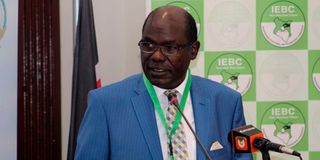Premium
IEBC sailing in rough seas as polls loom

Mr Wafula Chebukati, the chairman of the Independent Electoral and Boundaries Commission (IEBC).
What you need to know:
- The commission has an experienced secretariat that has served since the days of the Interim Independent Electoral Commission (IIEC).
- But failure by the commissioners to listen to staff when making decisions portends a bumpy ride for the commission.
With less than 10 months to the 2022 General Election, the electoral commission is already facing a rough patch.
The lack of adequate budgetary allocation, cancelation of its tenders and delays in appointing a substantive CEO and secretary to the Independent Electoral and Boundaries Commission (IEBC) are the Achilles’ heel of the seven-member agency.
The likelihood that it may take quite some time for the four commissioners who were recently appointed to acclimatise to the challenges of superintending an election adds onto the woes facing the electoral body.
The commission has an experienced secretariat that has served since the days of the Interim Independent Electoral Commission (IIEC) having overseen the 2010 referendum on the new constitution, the 2013 and 2017 elections and many by-elections.
But the failure by the commissioners to listen to staff when making decisions as has happened in the past, portends a bumpy ride for the commission.
This comes even as electoral and governance experts warn that the inaction of the Justice and Legal Affairs Committee of the National Assembly, may compound the issues affecting the commission.
The committee chaired by Kangema MP Muturi Kigano oversees the IEBC chaired by Mr Wafula Chebukati.
Ms Koki Muli, an expert in electoral matters, blamed the committee and Parliament at large “for doing little” to help the commission prepare adequately for the coming elections.
Credible election
“This is the moment you expect the committee and Parliament to be really up and down in helping the commission conduct a credible election. It starts with budgetary allocation, legislative and general oversight,” Ms Muli, a lecturer at South Eastern Kenya University, said.
“What is coming up is that the commission and Parliament seem to be speaking at cross purposes. This should not be the case,” she added.
Mr Kigano was not available for a comment.
The commission had requested to be allocated Sh40 billion in the current financial year to prepare adequately for the coming elections.
However, it was allocated Sh26 billion, which is Sh14 billion less what it asked for.
Mr Chebukati did not respond to our inquiries on the preparedness of the commission.
But even as Mr Chebukati remained mum, the Daily Nation has established that the commission is mulling challenging the decision of the Public Procurement Administrative Review Board (PPRAB) to nullify the Sh3 billion tender.
The tender involved supply and delivery of ballot papers and voter register among others, for the 2022 elections.
Sh4.5 billion tender
The tender had been awarded to Inform Lykos (Hellas) SA, a Greek company, but PPARB, in its decision of November 17, 2021, directed the commission to restart the tender process at the financial evaluation stage.
The tender also involved supply and delivery of statutory election result declaration forms to be used at the polling station, election and referendum result declaration forms to be used at the constituency and county levels as well as at the national tallying centre.
The cancellation comes barely three months after the board nullified a Sh4.5 billion tender that IEBC had also awarded to the Greek company.
The tender that would later be restored by the High Court following an appeal by the IEBC, involved the supply, delivery and maintenance of the Kenya Integrated Elections Management System (Kiems) kits for the 2022 General Election.
Mr Barasa Nyukuri, a governance expert, says that IEBC lacks the requisite oversight in the conduct of its affairs.
“You read the judgments by the tribunals and the courts on the various decisions the commission has undertaken and challenged successfully, and you wonder whether the commission is operating in isolation,” says Mr Nyukuri.
“Both Parliament and IEBC should work together. That is what the two government bodies have been mandated to do by Kenyans,” adds Mr Nyukuri.
The commission is likely to challenge the PPRAB ruling on ballot papers at the High Court again.
Substantive CEO
This means that it may take long should the parties in the case decide to prosecute the matter all the way to the Supreme Court.
The board cancelled the Kiems kit tender after finding that IEBC had not followed the law while shopping for the new system that will be used to identify voters and transmit results on the voting day.
The decision of the board was as a result of a request for review lodged by one of the interested bidders, Risk Africa Innovates Ltd.
But Justice Jairus Ngaah quashed the decision after finding that the board erred because the company was not a candidate for the tender.
The delays in appointing a substantive CEO to replace Mr Ezra Chiloba who was sacked in 2018 may also contribute to the IEBC’s failure to prepare adequately for the coming election.
Mr Marjan Hussein has been acting ever since, contrary to the Public Service Act.
The CEO is the accounting officer of the commission and a central figure in the various procurements ahead of the election.
The law provides that an officer may be appointed in an acting capacity for at least 30 days but not more than six months.
Mr Marjan has been in an acting capacity for the past three years.





